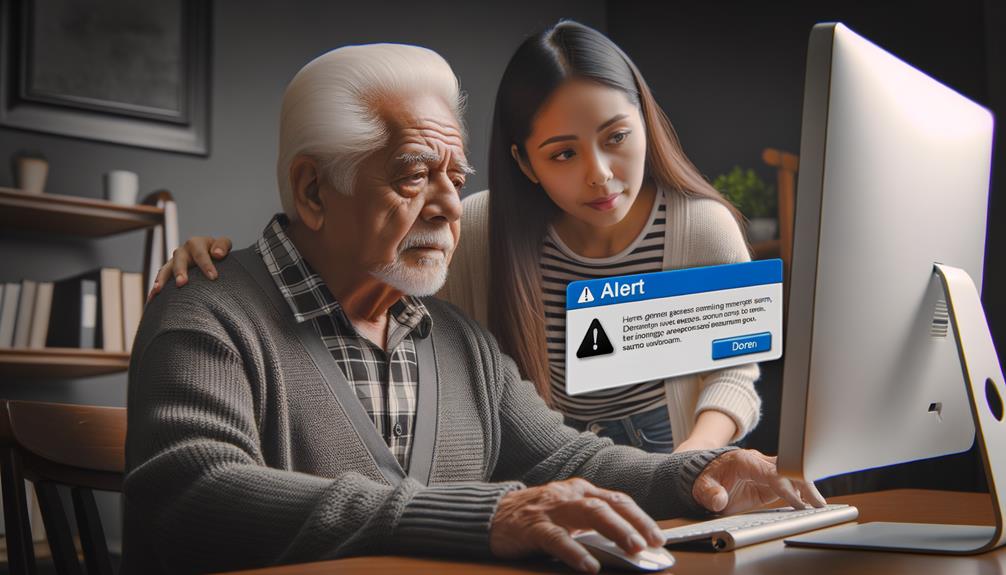Recent research shows that seniors, aged 50 and above, are prime targets for online scammers, comprising over 50% of reported scams. As technology advances, seniors must gain knowledge and tools to shield themselves from online scams. While the internet is a valuable resource for seniors, it also presents risks that they must recognize. It is crucial for them to grasp how to safely navigate the digital world and steer clear of malicious schemes to safeguard their financial and personal well-being.
Understanding Common Scams

Understanding scams targeting seniors is crucial for safeguarding their financial well-being. Seniors are often targeted, and it's essential for them to be aware of warning signs. One sign of a Medicare scam is when someone requests personal information, such as the Medicare number, claiming it's for a new card or benefits. Seniors should avoid sharing sensitive details and review Medicare Summary Notices for discrepancies indicating fraud. Elder fraud also encompasses online scams, where scammers use tactics to obtain personal information. Seniors should be cautious about sharing details online and regularly update privacy settings to prevent unauthorized access.
Identifying Red Flags
As seniors identify potential red flags for scams, they should watch out for unsolicited offers and requests for personal information. Caution is essential, especially when responding to unsolicited requests for personal or financial information. Scammers often pretend to be trusted entities like Medicare or financial institutions in order to deceive seniors into sharing sensitive details. Red flags should be raised when there is a request for urgent action or threats of consequences for not providing information. Offers that appear too good to be true, such as winning a prize in a contest the senior never entered, are another common red flag. Seniors should also be cautious of individuals or organizations pressuring them to make immediate financial decisions without allowing them sufficient time for research or advice. By being mindful of these red flags, older adults can safeguard their privacy and finances from potential fraud. Staying informed and seeking advice from trusted sources before taking any action in response to important updates or requests for personal information is crucial for seniors.
Building Online Safety Skills

To improve online safety, seniors must educate themselves about protecting personal information and preventing scams. Stay updated on the latest scam tactics, such as phishing emails and fake tech support calls. Learn to adjust privacy settings on social media to limit personal information access. Use strong, secure passwords and update them regularly. Install reliable antivirus software to prevent malware attacks on online devices. Be cautious of unsolicited offers and requests for personal information to avoid scams. Report suspicious activities to the proper authorities and seek support if scammed. Actively building online safety skills helps seniors protect their financial information and personal data from scams and fraud.
Reporting Suspicious Activity
When encountering suspicious activity, promptly report it to authorities to prevent harm and protect from potential scams and fraud. Suspect financial abuse? Contact local law enforcement. For Medicare scams, report to 1-800-MEDICARE or local Senior Medicare Patrol. If victim to a possible scam, notify the bank or credit card company to prevent unauthorized transactions. Encourage reporting online scams to proper authorities and seek advice from trusted sources when targeted. Keep records of all scam-related communications and transactions. Educate oneself and others about the scam to prevent future victims. Stay informed about reporting procedures and receive updates from reputable sources like the National Council on Aging (NCOA) and the Better Business Bureau. Seek guidance from a trusted financial advisor for insights on reporting suspicious activity.
Engaging in Community Education Programs

Participating in Community Education Programs equips seniors with knowledge to defend against financial exploitation. These programs teach how to recognize warning signs and stay cautious. Seniors gain skills and knowledge to protect themselves from scams. The Federal Trade Commission and NCOA recommend these programs. They cover various topics such as online scam prevention and healthcare scams. Additionally, participating in these programs fosters a sense of community. Seniors come together to learn and support each other. Actively engaging in these programs helps seniors stay informed and connected while protecting themselves.
Frequently Asked Questions
What Are 4 to 5 Ways Scamming Can Be Prevented?
In order to prevent identity theft, seniors should be cautious of phishing emails. Additionally, they should verify social media requests and only shop on secure websites. It's important to avoid tech support scams, investment fraud, and lottery, romance, and charity scams. Ensuring strong password protection is also essential.
How Can Seniors Stay Safe Online?
To ensure online safety, seniors must prioritize email safety, manage passwords, and be aware of social media. By being cautious of phishing and staying updated on scam alerts, they can protect themselves.
How Do You Protect Seniors From Telephone Scams?
In order to protect seniors from telephone scams, they need to activate robocall protection and be vigilant against phone fraud. Additionally, they should verify unfamiliar callers. Prioritizing elderly scam prevention and practicing phone call safety are crucial for senior fraud protection.
What Are the Computer Security Tips for Seniors?
Are you interested in enhancing computer security for seniors? First, ensure effective password management. Next, practice email safety and be cautious on social media. Also, stay vigilant against phishing attempts and shop securely online. Install virus protection and secure wifi for added security. Additionally, remember to backup data and stay alert to scams, and prioritize cyber education.
Conclusion
In summary, seniors safeguard against online scams through awareness and vigilance. Learning about common scams and recognizing red flags is crucial. Equipping themselves with online safety skills helps reduce the risk. Reporting suspicious activity and engaging in community education programs are also vital steps in scam prevention. Are you prepared to take control of your online safety and steer clear of scams?



